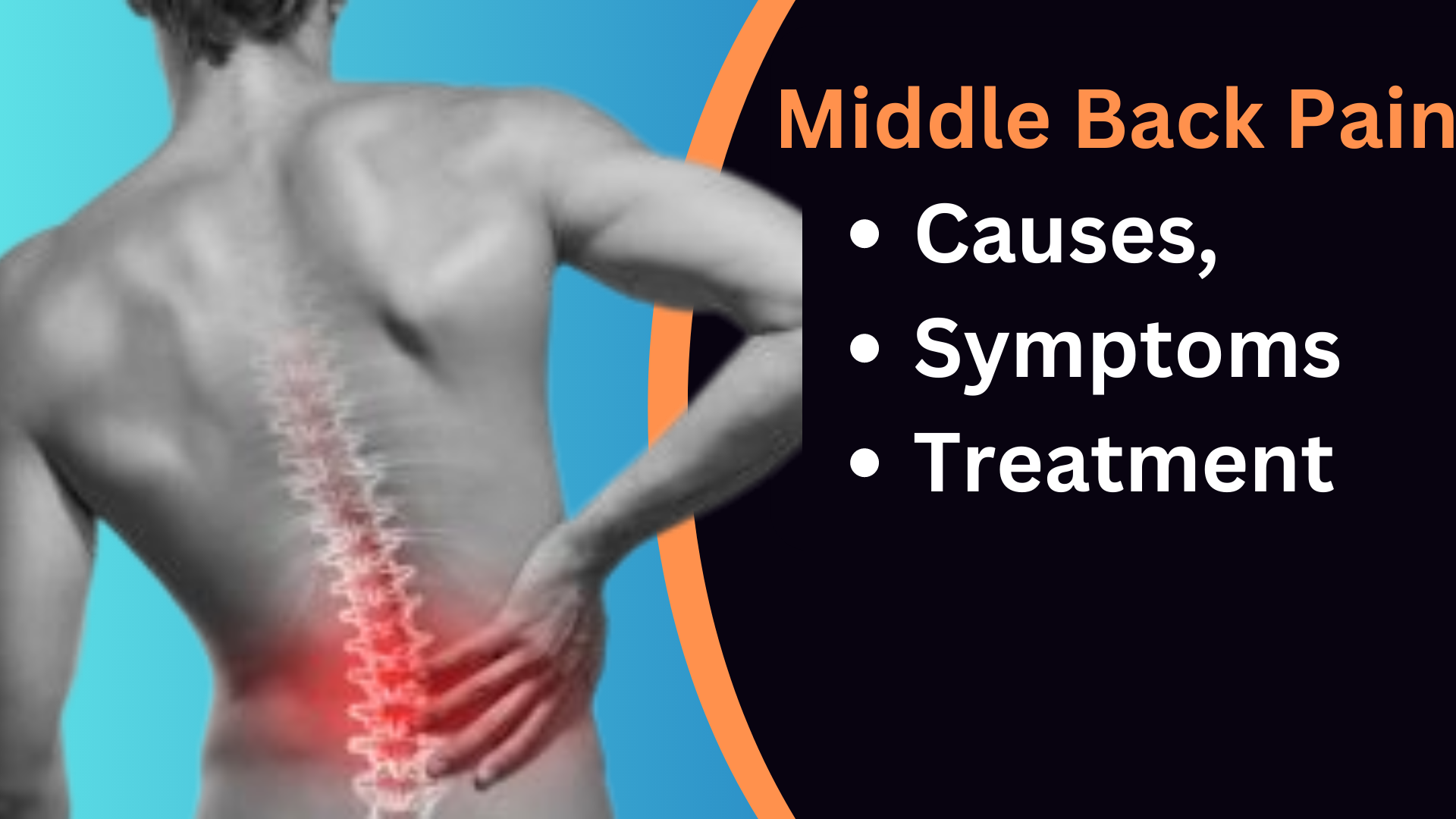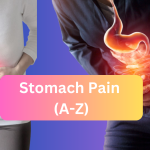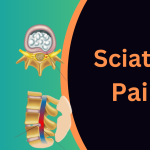Middle Back Pain (A-Z): Causes, Types, Symptoms & Treatment. Learn about mid back pain right or left side, upper/lower/middle right side back pain, upper back right pain, lower middle back pain.
Impact trauma, arthritis, ruptured discs, muscle strains, scoliosis, poor posture, and many other conditions can all be reasons for middle back discomfort.
The thoracic spine, which is located in the back between the ribcage and the base of the neck, is frequently referred to as the “middle back.”
What Is Middle Back Pain?
Middle back discomfort is more of a symptom than a true condition, and it typically indicates a thoracic spine injury or illness.
When compared to Upper Back Pain or Lower Back Pain, the thoracic spine has a much smaller range of motion.
Its primary purposes are to stabilize the body, safeguard the spinal cord, and act as a point of attachment for the ribs and numerous muscle groups.
What Causes Middle Back Pain?
Compared to the reasons for lower back or neck pain, the underlying significant spinal pathology is more frequently the source of thoracic spine discomfort.
However, this symptom can also appear in healthy people who don’t appear to be ill or injured.
This might be brought on by using a heavy backpack, playing particular sports, sitting in a high chair at school, or straining while doing homework, among other things.
Common Causes Include:
1.) Lifestyle
Middle back discomfort can be brought on by aging, as well as regular strain on the spine and back muscles. Additionally, lifestyle factors like slouching, obesity, inactivity, and smoking have an impact.
2.) Strain or Sprain
This injury results from lifting something heavy incorrectly or suddenly and jerkily stretching or injuring your back’s muscles, tendons, or ligaments.
3.) Injury
It can result from sports-related injuries, falls, and injuries sustained in auto accidents.
4.) Herniated or Bulging Discs
The strain on the nerves caused by compressed, bulging, or ruptured thoracic spinal discs can result in excruciating middle back pain.
5.) Osteoarthritis
The bones may rub against one another and result in uncomfortable symptoms in the middle back when the cartilage lining the joints deteriorates.
6.) Pinched Nerve
Your back’s compressed nerves can cause pain ranging from mild to severe. Click to learn all about Nerve Pain.
6 Types of Back Pain:
1.) Back Pain Accompanied by Numbness or Tingling
Along with back pain, numbness or tingling in your arms or legs may be a sign of a spinal problem, such as a pinched nerve.
Numerous back conditions, such as sciatica (Sciatica Pain), spinal stenosis, or disc herniation, can send “pins and needles” sensations down the limbs.
Visit your primary care physician if you are only now starting to experience this symptom; they should be able to determine whether you require specialized care.
On the other hand, if you’ve had this condition for a long and it’s gotten worse over time, you might want to go straight to an orthopedic spine expert.
2.) Back Pain after a Traumatic Event or Injury
The body is put under a lot of stress after a traumatic event, like a fall or a vehicle accident. After an injury, people can sometimes walk and resume their normal activities, but later they experience discomfort and dismiss it.
Even though the source of your pain might not always be obvious to the naked eye, this does not lessen the urgency of the situation.
Visit a doctor as soon as you can if you experience any physical changes following a traumatic event, such as aches, pinching, strain, or weakness.
3.) Back Pain That Persists for Months
Back pain can be categorized as either Acute Pain or Chronic Pain. Chronic back pain lasts more than three months, whereas acute back pain lasts from one week to three months.
If you have persistent back discomfort, it can be a sign of a back disorder such as degenerative disc disease. Regardless of the source, having that much consistent pain can seriously impair your quality of life and calls for a trip to your healthcare physician or an orthopedic specialist.
4.) Back Pain with the Loss of Bladder or Bowel Control
Incontinence may result from spinal nerve compression’s impact on the organs that regulate bowel and bladder function.
It is never advisable to ignore this severe symptom. You should seek emergency care right away if your bladder or bowel function is declining because this symptom indicates that there is a serious problem.
5.) Back Pain Accompanied by a Fever
Back discomfort and fever are warning signs that your body may be battling a dangerous infection that requires prompt medical attention.
In situations like this, the fever is probably not a typical viral fever. Instead, this fever may be your body’s reaction to a spinal infection, such as an epidural abscess, if it is present along with back pain.
6.) Back Pain That Prevents You from Performing Routine Tasks
Finally, you should see a doctor if your back pain interferes with your ability to go about your daily activities.
Back discomfort shouldn’t be caused by activities like standing up, bending over to reach something, or low-impact exercise, and you shouldn’t feel restricted from engaging in these activities because the pain might be too severe.
If your back pain ever affects your daily life in this way, it’s time to schedule an appointment with a back pain specialist who can identify the source of the issue and walk you through your options for treatment.
Symptoms of Middle Back Pain
There are many different ways to describe the discomfort people feel in their middle back, including tenderness, tightness, or stiffness. Patients may also describe their discomfort as being stabbing, dull, or sharp.
Additional side effects that sometimes accompany middle back pain include:
- Anxiety or discomfort that spreads to your hips, shoulders, or neck
- Muscle pain
- You experience arm or leg weakness
- Numbness or tingling in the extremities, belly, or chest
- Chest discomfort
- A lack of bowel or bladder control
Middle Back Pain Treatment
For middle back pain, there are many efficient and cutting-edge therapy alternatives available, but here is some medicine that is very powerful to treat the pain related to muscle.
Q.) What Causes Mid Back Pain?
Accidents and injuries are some of the most typical causes of mid-back pain. Over time, the pain might also develop as a result of routine physical tensions and motions.
Q.) What Should I Do If I Struggle with Mid-back Pain?
The messages your body sends you shouldn’t be disregarded. In general, your recuperation can start sooner the earlier you deal with the pain. Chiropractic therapy is one of several effective methods for treating this issue.
Q.) How Do I Prevent Mid Back Pain?
Future discomfort can be avoided by maintaining adequate spinal alignment and leading a balanced lifestyle that includes good eating and exercise. Regular chiropractic spinal manipulation treatments can reduce the tension and soreness that has built up in the mid back.
Q.) How Can a Chiropractic Adjustment Help My Mid Back Pain?
The method of chiropractic adjustment might put you on the road to recovery. The practice’s restorative advantages can lessen pain signals that the thoracic spine sends to the brain.
Q.) What Is Middle Back Pain Accompanied by a Symptom?
Middle back pain accompanied by other symptoms like a headache, fever, shortness of breath, or numbness may point to a more serious underlying condition. For example, middle back pain accompanied by a headache could be due to tension or nerve compression, while fever may suggest an infection. It’s important to take note of any additional symptoms and seek medical help if the pain is severe or persistent.
Q.) How Long Is Treatment Needed?
Depending on the underlying cause, everybody responds to therapy on a different timetable. Our treatment programs will be developed specifically for each patient’s requirements.
Q.) Why does my middle back hurt?
There are many reasons for middle back pain due to muscle strain or tension caused by poor posture, overuse, or even due to lifting heavy objects.
Q.) Why middle back pain suddenly comes and goes?
The pain which comes and goes has many causes like muscle strain, poor posture, or even due to spinal issues. To treat this type of pain it is said to maintain good posture, engage in regular exercise and seek for best medication.
Q.) Middle of back pain pregnancy, why?
Middle back pain during pregnancy happens due to hormonal changes and a growing uterus that shifts forward which can cause pain. The weight gain during pregnancy which adds extra pressure on the spine and cause middle back pain.
Q.) Middle back pain in the spine, the reason?
There are various reasons like, herniated discs, osteoarthritis, spinal misalignment, and poor posture.




